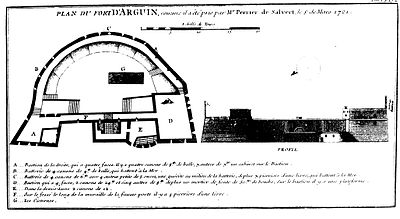| Revision as of 18:38, 23 June 2009 editAuntieruth55 (talk | contribs)Autopatrolled, Extended confirmed users, Pending changes reviewers, Rollbackers37,272 editsm Added {{cleanup}} and {{nofootnotes}} tags to article. using Friendly← Previous edit | Revision as of 07:21, 9 July 2009 edit undoWoohookitty (talk | contribs)Administrators611,225 editsm Disambiguate Electorate to Prince-elector using popupsNext edit → | ||
| Line 11: | Line 11: | ||
| In 1633, during its ] (which then controlled Portugal), the ] seized control of Arguin. It remained under Dutch rule until 1678, although Dutch governance was interrupted by ] rule in 1665. ] briefly controlled the island in September 1678, but the island was then abandoned until 1685. | In 1633, during its ] (which then controlled Portugal), the ] seized control of Arguin. It remained under Dutch rule until 1678, although Dutch governance was interrupted by ] rule in 1665. ] briefly controlled the island in September 1678, but the island was then abandoned until 1685. | ||
| Arguin was a ] of the ] ] of ], and its successor, the ], from 1685 to 1721. France then took control of the island, only to lose it again the following year to the ]. France regained it in 1724. This period of French rule lasted four years, because, in 1728, it reverted to the control of Mauritanian tribal chiefs. The island became a French possession once more during the early twentieth century, as part of the French colony, ], and it remained under Mauritanian rule when that country became independent in 1960. | Arguin was a ] of the ] ] of ], and its successor, the ], from 1685 to 1721. France then took control of the island, only to lose it again the following year to the ]. France regained it in 1724. This period of French rule lasted four years, because, in 1728, it reverted to the control of Mauritanian tribal chiefs. The island became a French possession once more during the early twentieth century, as part of the French colony, ], and it remained under Mauritanian rule when that country became independent in 1960. | ||
| == Sources == | == Sources == | ||
Revision as of 07:21, 9 July 2009
| This article may require cleanup to meet Misplaced Pages's quality standards. No cleanup reason has been specified. Please help improve this article if you can. (June 2009) (Learn how and when to remove this message) |
| This article includes a list of references, related reading, or external links, but its sources remain unclear because it lacks inline citations. Please help improve this article by introducing more precise citations. (June 2009) (Learn how and when to remove this message) |


Arguin (Template:Lang-pt) is an island off the western coast of Mauritania in the Bay of Arguin, at 20° 36' N., 16° 27' W. It is six km long by two broad. Off the island are extensive and dangerous reefs. It is now part of The Banc d'Arguin National Park.
History
Arguin has long been coveted by seafaring nations for its strategic location, and control over the island has changed hands numerous times. The first European to visit the island was the Portuguese explorer Nuno Tristão in 1443. In 1445, Prince Henry the Navigator set up a trading post on the island, which acquired gum arabic and slaves for Portugal. By 1455, 800 slaves were shipped from Arguin to Portugal every year.
In 1633, during its war against Spain (which then controlled Portugal), the Netherlands seized control of Arguin. It remained under Dutch rule until 1678, although Dutch governance was interrupted by English rule in 1665. France briefly controlled the island in September 1678, but the island was then abandoned until 1685.
Arguin was a colony of the German electorate of Brandenburg, and its successor, the Kingdom of Prussia, from 1685 to 1721. France then took control of the island, only to lose it again the following year to the Netherlands. France regained it in 1724. This period of French rule lasted four years, because, in 1728, it reverted to the control of Mauritanian tribal chiefs. The island became a French possession once more during the early twentieth century, as part of the French colony, Mauritania, and it remained under Mauritanian rule when that country became independent in 1960.
Sources
- 1911 Britannica article
- Lander's Travels—The Travels of Richard Lander into the Interior of Africa
- Portuguese slave routes
- Rulers of Arguin
| Portuguese Empire | ||||||||||||||||||||||||||||||||||||||||||||||||||||||||||||||||||||||||
|---|---|---|---|---|---|---|---|---|---|---|---|---|---|---|---|---|---|---|---|---|---|---|---|---|---|---|---|---|---|---|---|---|---|---|---|---|---|---|---|---|---|---|---|---|---|---|---|---|---|---|---|---|---|---|---|---|---|---|---|---|---|---|---|---|---|---|---|---|---|---|---|---|
|  | |||||||||||||||||||||||||||||||||||||||||||||||||||||||||||||||||||||||
| ||||||||||||||||||||||||||||||||||||||||||||||||||||||||||||||||||||||||
| ||||||||||||||||||||||||||||||||||||||||||||||||||||||||||||||||||||||||
| ||||||||||||||||||||||||||||||||||||||||||||||||||||||||||||||||||||||||
| ||||||||||||||||||||||||||||||||||||||||||||||||||||||||||||||||||||||||
| ||||||||||||||||||||||||||||||||||||||||||||||||||||||||||||||||||||||||
| ||||||||||||||||||||||||||||||||||||||||||||||||||||||||||||||||||||||||
| Territories and provinces of Prussia (1525–1947) | |
|---|---|
| Before 1701 | |
| After 1701 |
|
| Post-Congress of Vienna (1814–15) |
|
| Territorial reforms after 1918 |
|
| Became Province of Posen in 1848. From the Lower Rhine and Jülich-Cleves-Berg. | |
| Dutch colonial empire | |||||||||||||||||||
|---|---|---|---|---|---|---|---|---|---|---|---|---|---|---|---|---|---|---|---|
| |||||||||||||||||||
| |||||||||||||||||||
| |||||||||||||||||||
| |||||||||||||||||||
| French overseas empire | |||||||||||||||||||||||||||||||||||||||||
|---|---|---|---|---|---|---|---|---|---|---|---|---|---|---|---|---|---|---|---|---|---|---|---|---|---|---|---|---|---|---|---|---|---|---|---|---|---|---|---|---|---|
| Former |
| ||||||||||||||||||||||||||||||||||||||||
| Present |
| ||||||||||||||||||||||||||||||||||||||||
20°36′N 16°27′W / 20.600°N 16.450°W / 20.600; -16.450
Categories: